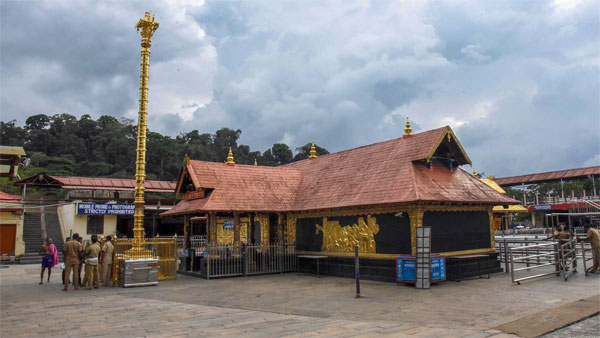
Explained: The Sabarimala case, its background and why a review was sought
New Delhi, Nov 14: On Thursday, the Supreme Court would deliver an important verdict in the Sabarimala case. A batch of review petitions challenging the SC verdict which allowed the entry of women of all ages into the Sabarimala temple was filed and the matter was heard in open court.
It was in September last year that the court lifted the ban on the entry of women into the Sabarimala Temple in the age group of 10 and 50.

The Supreme Court had said that devotion cannot be subjected to gender discrimination. The court also said that a patriarchal notion cannot be allowed to trump equality in devotion.

In a 4:1 verdict, Justice Indu Malhotra had penned a dissenting opinion. Justice R Nariman and D Chandrachud had concurred with the findings of the CJI and Justice Khanwilkar.
The then CJI, Dipak Misra said that women cannot be treated as lesser or weak. He said that in this country women as worshipped like Goddesses. Any physiological or biological factor cannot be given legitimacy if they don't pass the muster of credibility, the CJI further observed. Exclusion on the grounds of biological, physiological features like menstruation is unconstitutional and discriminatory, the Bench also said.
The CJI further observed that exclusion of women of a certain age into the temple is not an essential part of religion. It is not integral either, the court said. 3(b) of the Kerala Temple Entry Act which excludes women between the age of 10 and 50 violates freedom of The Hindu religion to worship. The right to worship equally belongs to both men and women, the Bench said while adding that the ban is religious patriarchy.
Justice Nariman in his judgment said that Ayyappa devotees do not form a denomination, but they are only a part of Hindu worship. In his separate but concurring judgment, he said that women of all ages are equal worshipers of Lord Ayyappa and hence gender cannot be a ground to prevent the entry of some into the temple on the ground that they were of menstruating age. He further said that the Sabarimala Temple custom of barring women in the age of 10 and 50 years is not backed by Article 26 of the Indian Constitution. Moreover, a woman has an equal right to worship, he also added.

Justice Chandrachud in his judgment said that to treat women as the children of a lesser God is to blink at the Constitution. He also said that popular notions about morality can be offensive to dignity of others. He also added that any custom or religious practise if it violates dignity of women by denying them entry because of her physiology is unconstitutional. To treat women as children of a lesser God is unconstitutional, he further added.
What was challenged:
Under challenge was the practice at the temple that bars women of the age group of 10 to 50 years.
The court had on October 13 last year referred the issue to a Constitution bench after framing five "significant" questions including whether the practise of banning entry of women in the temple amounted to discrimination and violated their fundamental rights under the Constitution.
One of the questions referred to the larger bench was, "Whether the exclusionary practise which is based upon a biological factor exclusive to the female gender amounts to 'discrimination' and thereby violates the very core of Articles 14, 15 and 17 and not protected by 'morality' as used in Articles 25 and 26 of the Constitution."
The review:
A plea filed by the National Ayyappa Devotees Association (NADA), which has sought review of the verdict, had said: "The notion that the judgment under review is revolutionary, one which removes the stigma or the concept of dirt or pollution associated with menstruation, is unfounded.
"It is a judgment welcomed by hypocrites who were aspiring for media headlines. On the merits of the case, as well, the said judgment is absolutely untenable and irrational, if not perverse."
Recommended Video

Besides the association, several other petitions, including one by the Nair Service Society (NSS), have been filed against the apex court verdict.
The NSS had said in the plea that as the deity is a 'Naistika Brahmachari', females below the age of 10 and after the age of 50 years are eligible to worship him and there is no practice of excluding worship by females.
"Hence, the delay or wait for 40 years to worship cannot be considered as exclusionary and it is an error of law on the face of the judgement," the plea had said.


 Click it and Unblock the Notifications
Click it and Unblock the Notifications


































